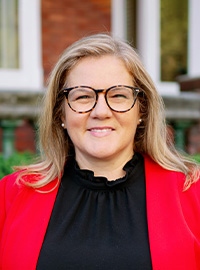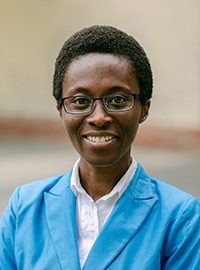-
95% graduates employed
-
Top 10 Catholic universities globally
-
Top 40 young universities worldwide
Diploma in Business
Course information for - 2026 entry
Domestic
- Domestic
- International
- Domestic
- International
Offered at 2 locations
- Melbourne
- North Sydney
- Melbourne
- North Sydney
- Duration
- 1 year full-time or equivalent part-time
- VTAC code
- 1200210631
- ATAR
- 50.00 for Melbourne
- Fees (first year)*
- Start dates
-
Semester 1 intake: Beginning February 2026
Applications open August 2025
Midyear (Semester 2) intake: Beginning July 2026
Applications open April 2026
Overview

The Diploma in Business is an important stepping-stone to achieve your career and study goals. Students who undertake this diploma will be able to gain credit for up to the first year of study and articulate into the second year of many of the bachelor's degrees in business at ACU or exit with the Diploma in Business as a standalone qualification.
Not only does our Diploma in Business have lower entry requirements than our bachelor's degrees, but it will help you to develop skills needed to succeed in more advanced tertiary study.
Our Diploma in Business provides domestic students with a Commonwealth supported place (CSP-funded) and will help you achieve your goals.
We are here to support you from start to finish whether you have just finished Year 12 or finished years ago. We ensure smaller class sizes, offer tailored support as you transition to university study, and provide a range of student services to help you succeed.
Our Diploma in Business will be offered at our Townsville Leadership Centre from 2024. This is a great option for those who wish to build their capabilities and gain a qualification. The Diploma in Business is a flexible offering for those who want to prepare for the future workforce, including (Student) Veterans and their families, but also for those who still want to continue serving in the AD
Student enrolling in professional terms can only study at the Township Leadership Centre.
Note: Student Veterans must enroll in the professional terms only.
Students completing the Diploma at Ballarat campus would transfer to their business Bachelor program at the Melbourne campus.
Course details
Course structure
To complete the Diploma in Business, a student must complete 80 credit points (cp).
Course map
Graduate statement
AQF framework
Entry requirements
An applicant must comply with the Admission to Coursework Programs Policy.
International students must also meet the English Language Proficiency requirements as defined in the Admission to Coursework Programs Policy.
For domestic students to be eligible for admission to the course, an applicant must have completed:
- Equivalent of year 12 level with the ACU minimum eligibility rank for Diploma programs; OR
- Entry via an alternative pathway as approved by ACU.
Student veterans may be eligible for Recognised Prior Learning.
Enrolment in Professional Terms are only available for students enrolled at the Brisbane campus with delivery to be offered at the Townsville Leadership Centre.
International applicants need to meet the English Language Proficiency requirements as defined in Schedule Three (Associate Degree, Diploma and Certificate courses) of the Admission to Coursework Programs Policy.
The entry requirements are as follows:
IELTS: Overall score: 6.0 individual score of: 5.5 in all tests
PTE: 50 with a minimum of 42 in all four communicative skills
TOEFL: Internet based total of 60: minimum 18 in writing, 8 in reading, 16 in speaking and 7 in listening
ACU English Language Test: C (60-64%)
C1 Advanced: Overall: 169 Individual score of at least 162 in all tests.
Disclaimer: The course entry requirements above are for 2026 Admission.
Adjustment factors
If you’re currently completing Year 12 you may be eligible for adjustment factors that can boost your rank and help you get into your desired course.
Adjustment factors may be applied to your TAC application if you study particular subjects, attend schools geographically close to our campuses or in certain regional areas, apply as an elite athlete or performer or meet certain other criteria.
Inherent requirement
There are essential components of a course or unit that demonstrate the capabilities, knowledge and skills to achieve the core learning outcomes of that course or unit. You will need to be able to meet these inherent requirements to complete your course.
Learn more about inherent requirements for your course and how they affect you
Pathways
Further study
Students who complete the Diploma in Business may apply for entry into the Bachelor of Commerce or Bachelor of Business. Credit will be given for units completed in the diploma program. It may also provide a pathway to a range of double degrees.
Fees
Course costs
*This is an indicative first-year fee based on the tuition fee rates for a full-time student, using unit enrolment data from domestic students who studied the course in the previous year.
A student’s annual fee will vary depending on factors including:
- Number of units studied per year
- Choice of major or specialisation
- Elective units
The University reviews fees annually.
You can view current course costs and domestic tuition fee rates by unit.
Payment options
You should be able to concentrate on getting good marks instead of worrying about how you’ll pay your fees. We have a number of options that can help you ease the financial burden, including government assistance, scholarships and income support.
Scholarships
You could be eligible for one of the hundreds of scholarships we award each year to help students from across the university with the cost of studying, accommodation or overseas study opportunities. Some of our scholarships are awarded on the basis of merit, but these aren’t just for the academically gifted; ACU also recognises excellence in community engagement and leadership. We also offer a range of scholarships for those who may be struggling financially or who have faced other barriers to accessing education.
How to apply
Domestic applicants
Direct application
Apply nowWe are happy to accept your application to this course. Remember, Victorian applicants can apply direct to ACU only if
▪you have not yet commenced a VTAC application and
▪you are not currently studying Year 12, and
▪you are applying to only one course only.
Deferment
Deferment is available for one year. Find out more about deferment: Deferment Information.
Staff Profile
Dr Betty Frino
Senior Lecturer, Peter Faber Business School
Dr Betty Frino is a scholar in Human Resources, Management and Organisational Behaviour. Betty’s professional career spans academe and applied/policy research within the higher education sector, exploring contemporary workplace issues and implications for government policy and professional practice. Betty has held previous appointments at the Universities of Sydney, Macquarie and Wollongong, teaching across various programs at both undergraduate and postgraduate levels. Bringing real work scenarios, contemporary issues and current research to the classroom setting is paramount to her teaching philosophy.
Betty has published widely in peer-reviewed and practitioner based journals, and presented her work at both academic and practitioner conferences on the international and domestic scale. She has been invited as guest lecturer at several international universities in Europe, Malaysia and UAE, and also appeared as an expert witness for state wage case decisions and produced commissioned reports for industry and government on wage trends and bargaining outcomes. Her research spans various topics about people at work, with specialist knowledge in employee engagement, employee voice, worker wellbeing/psychosocial hazards, the regulation of work/labour law, wages, bargaining and pay equity.
Her current research projects explore worker wellbeing in a Covid-era, and the scope and nature of hybrid work and its impact on wellbeing. Betty’s passion is to conduct scholarly research that has real-world application, informing organisational leaders, practitioners, and policy makers about ways to address challenges confronting the modern workplace to ensure a sustainable and fair work setting for all.
Dr Victoria Obeng
Lecturer, Peter Faber Business School
Dr Obeng is a lecturer with Peter Faber Business School. She has worked in industry as teaching consultant for finance and a board member of a finance company. She has teaching experiences from different parts of the world. She has taught in Latrobe University, University of Ghana, and Ghana Technology University College in the areas of financial accounting, auditing and management accounting. Her research interests include corporate governance, board diversity, earnings management, corporate financial reporting and disclosure and the accounting regulatory environment. She has published several research papers in her early academic career and refereed journal articles in her research areas. She is also a member of the Institute of Chartered Accountants Australia and New Zealand and the Institute of Chartered Accountants, Ghana.



